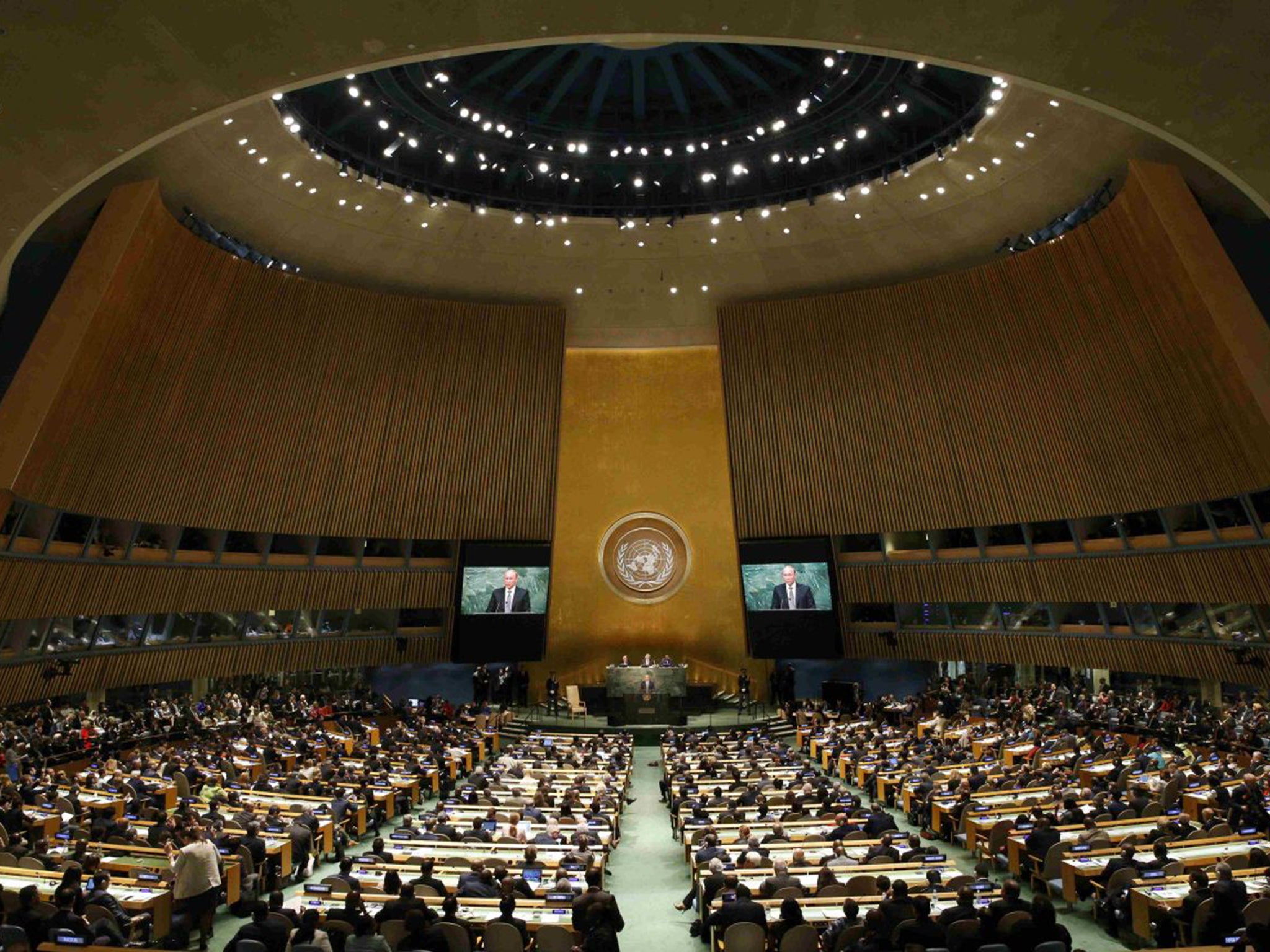UN General Assembly: Barack Obama and Vladimir Putin stress similarities as diplomatic speed-dating gets underway
The Assembly's first day always matters most, never more so than on this 70th anniversary

Words, words. If but a quarter of the torrent of them that pours forth from the mouths of world leaders at the General Assembly week could be put into effect, the United Nations would be the world’s peacemaker its founders intended back in 1945. And never more so than today.
Rarely have the choreographers of these occasions done their job so perfectly as for this 70th anniversary. The first day of the Assembly is always the one that matters most (come the third or fourth, the speechifying starts to wear).
For reasons lost in the mists of UN history, Brazil, as always, kicked things off, this time in the person of President Dilma Rousseff. Then came Barack Obama, permitted 45 minutes rather than the standard 15 as leader of the host country, followed by the leaders of its three main global competitors, Russia’s Vladimir Putin, China’s Xi Jinping and Iran’s President Hassan Rouhani, as well as François Hollande of France.
Human beings need ideals, they need a vision and they need honesty. In that sense at least, Mr Obama is the perfect American president for the UN. He’s an uplifting speaker. Unlike George W Bush, he doesn’t ride roughshod over the organisation: indeed, his multinational upbringing makes him almost a micro-specimen of it, adding credibility to his urgings that diplomacy and selfless joint action, not the doctrine of “might is right”, were the answer to global problems.
Mr Obama had pledged to be blunt, and he was: not just in criticising familiar villains such as Russia and Iran (yet promising to work with them on Syria, right now the biggest problem of them all) but in chastising the West as well, in particular for its lack of follow-through in Libya that permitted the post-Muammar Gaddafi chaos there. As for America itself, he said, it too was not immune to the elements that make the world so volatile, its tribalism and ever more dysfunctional democracy.
The loudest applause came when he said Washington’s Cuba embargo – an issue on which the US used to find itself in an effective minority of one in Assembly votes – should long ago have been scrapped. The second-loudest followed his warning that Islam should not be automatically associated with violence.
Like his US counterpart, Mr Putin too stressed the importance of “common values and common action”. The militants were “making a mockery of Islam”, he added, echoing Mr Obama. As usual, where the American was lofty and analytical, the Russian was terse and down to earth. Nonetheless, if words alone could put the world to rights, the morning of 28 September 2015 should surely have done the trick.
And this morning was merely the start of it. This week, approaching 200 heads of government are in New York. The diplomatic permutations are endless – not so much in the set speeches, but in the private meetings in diplomatic missions and discreet dining rooms, and the “accidental” encounters in corridors. Even the unspoken gestures matter: who stuck around to listen to whom, the body language, the handshakes accepted or avoided.
Few moments in the chamber proper linger in the memory. Nikita Khrushchev banging his shoe to be sure, and maybe Iran’s Mahmoud Ahmadinejad accusing the US of setting up the 9/11 attacks to help Israel – even Gaddafi as he threw the elaborate timetable into chaos one year by droning on for 90 minutes, instead of the allotted 15.
Behind the scenes, though, it’s a different story. In seven days US Secretary of State John Kerry has scheduled 55 bilateral meetings (“bilats” as they are known in the trade) with his foreign opposite numbers. Diplomatic speed-dating, Mr Kerry calls it.
But what difference will it all make? General Assemblies come and go, lofty speech follows lofty speech, extolling the virtues of togetherness and international co-operation. But the problem, as always, is: togetherness on whose terms? That is the nub of the Syria problem: tackle Isis and forget about the brutality of President Assad, as Moscow argues, or keep sights trained also on Assad’s removal, as the US insists?
When the fest of words is finally done, the world will almost certainly look much as it did before, messy and increasingly unmanageable. More than anything, UNGA week in New York offers a precious snapshot of the world as it is. It’s not a pretty picture.
Subscribe to Independent Premium to bookmark this article
Want to bookmark your favourite articles and stories to read or reference later? Start your Independent Premium subscription today.

Join our commenting forum
Join thought-provoking conversations, follow other Independent readers and see their replies